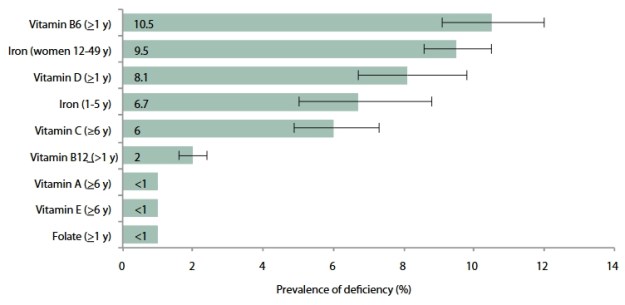First, there was this, a chart by the CDC that shows an elevated rate of deficiency for vitamin B6 among Americans:
Then a new study finds “a clear increase in colorectal cancer risk” among those with vitamin B6 deficiency:
Vitamin B-6 And Colorectal Cancer Risk: A Prospective Population-Based Study Using 3 Distinct Plasma Markers Of Vitamin B-6 Status, American Journal of Clinical Nutrition, April 2017
Background: Higher plasma concentrations of the vitamin B-6 marker pyridoxal 5′-phosphate (PLP) have been associated with reduced colorectal cancer (CRC) risk. Inflammatory processes, including vitamin B-6 catabolism, could explain such findings.
Design: This was a prospective case-control study of 613 CRC cases and 1190 matched controls nested within the Northern Sweden Health and Disease Study (n = 114,679). Participants were followed from 1985 to 2009, and the median follow-up from baseline to CRC diagnosis was 8.2 y.
Conclusions: Vitamin B-6 deficiency as measured by plasma PLP is associated with a clear increase in colorectal cancer risk. Furthermore, our analyses of novel markers of functional vitamin B-6 status and vitamin B-6–associated oxidative stress and inflammation suggest a role in tumor progression rather than initiation.
If 1 in 10 people are outright deficient, then a whole lot more are walking around in a state of insufficiency.
As I said in my previous post, not getting enough B6 in the diet isn’t the only cause of deficiency. In fact:
In the 2003–2004 NHANES analysis, plasma PLP [a B6 metabolite] concentrations were low even in some groups that took 2.0–2.9 mg/day, which is higher than the current RDA.
What could be causing deficiency in people who are getting up to twice the RDA? That colon cancer study alluded to it … inflammation, among other causes:
- Alcohol use (alcohol produces acetaldehyde which decreases PLP formation and competes with PLP in protein binding)
- Obesity
- Pregnancy, especially with preeclampsia or eclampsia
- Malabsorption syndromes such as celiac disease, Crohn’s disease, ulcerative colitis
- Renal diseases, chronic renal insufficiency, and other kidney diseases
- Diabetes (it’s associated with inflammation, obesity, and kidney problems)
- Medications such as antiepileptic drugs, and theophylline used to treat breathing problems
- Rheumatoid arthritis
I pulled these out of a government fact sheet that goes into more detail about mechanisms. It also points out that taking supplements doesn’t always help, e.g. regarding cancer:
The small number of clinical trials completed to date has not shown that vitamin B6 supplementation can help prevent cancer or reduce its impact on mortality. For example, an analysis of data from two large randomized, double-blind, placebo-controlled trials in Norway found no association between vitamin B6 supplementation and cancer incidence, mortality, or all-cause mortality.
Improving B6 status is more about fixing the conditions that deplete it (see list) than it is about getting enough in the diet (which is easy to do, one cup of chick peas supplies 100% RDA, peanut butter, potatoes, bananas are also good sources.)
Having a hole in the dam keeps the reservoir from being filled.

